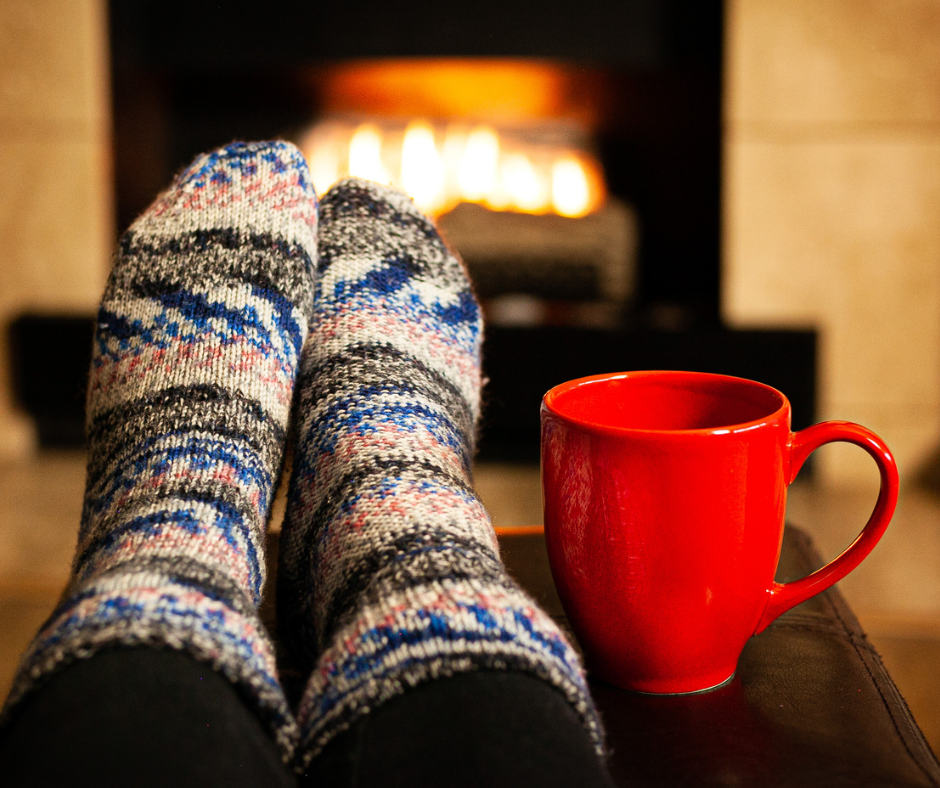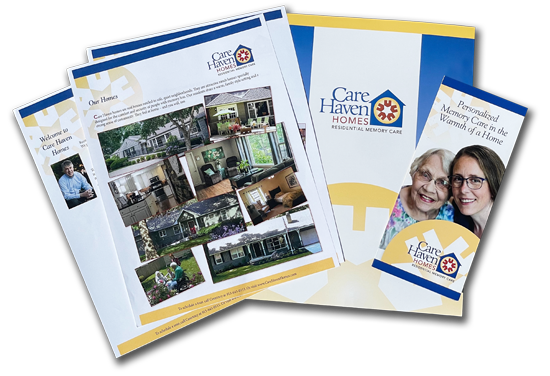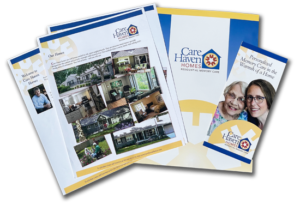As heavy frost signals the approach of colder weather, prepare to guard against new seasonal hazards. Follow these winter safety tips for seniors, whether the winds blow bitter or mild.
#1 Winter Safety Tip: ALWAYS Dress in Layers

Protecting older friends and family members against hypothermia is critical, even indoors or if it’s unseasonably warm outside. Over time, many seniors’ sensory and circulatory systems change, both
- Leaving them more sensitive to fluctuating temperatures and
- Damaging the body’s critical “warning systems.”
Alzheimer’s and other forms of dementia further complicate matters as they take away someone’s ability to explain why they’re uncomfortable.

Protecting older friends and family members against hypothermia is critical, even indoors or if it’s unseasonably warm outside. Over time, many seniors’ sensory and circulatory systems change, both
- Leaving them more sensitive to fluctuating temperatures and
- Damaging the body’s critical “warning systems.”
Alzheimer’s and other forms of dementia further complicate matters as they take away someone’s ability to explain why they’re uncomfortable.
If you plan an outing when the wind chill is below 70o F, then have Mom wear a jacket over a sweater and blouse or T-shirt. All layers should fit loosely, trapping pockets of warm air between them. (Tight clothing cuts down on blood circulation, resulting in body heat loss.)
If the wind chill is below 60o F, swap that jacket for a heavier coat paired with a hat and gloves. And don’t forget to layer!
When indoors, have Mom wear socks, slippers and a sweater if the house is cold. See that she throws on a blanket while sitting or sleeping.
Be on alert for the early signs of hypothermia1:
- Cold feet and hands
- Puffy or swollen face
- Pale skin
- Shivering — a common symptom, but not always present
- Slower than normal speech or slurred words
- Sleepiness
- Anger or confusion
According to the National Insitute on Aging, it’s critical to intervene before Mom progresses to the late stages of hypothermia:
- Slowing movement, trouble walking or being clumsy
- Stiff and jerky arm or leg movements
- Slow heartbeat
- Slow, shallow breathing
- Blacking out or losing consciousness
Then it’s time to call 911. Wrap Mom and offer her a warm drink (but no alcohol or caffeine) to gently warm her while you wait for help.
#2: Keep Safe While Staying Warm
Surely you’ve heard about fire and carbon monoxide risks associated with space heaters. But what about the dangers of heating pads and electric blankets? Do you also follow the critical winter safety tips for warm baths and hot water bottles?
As people age, many suffer illnesses or injuries that irritate, compress or damage our nerves. As a result, parts of our bodies may grow numb — especially if we suffer from uncontrolled diabetes.
Do you use an electric pad or warm bath for Dad’s heat therapy – or to fight a chill? Then proceed cautiously, as if you’re protecting a baby’s sensitive skin. Dad may neither feel the burning heat nor find the words to tell you of his pain.
If you want Dad to climb into a toasty bed each evening, then try a technique many hospitals use. Warm sheets and blankets with your heating pad BEFORE you drape them over Dad. (Then, put the device away, out of sight, so he isn’t tempted to use it unsupervised later.)
#3: Mend the Cracks in Your Armor
Mom dutifully washes her hands to avoid seasonal colds and flu. As she scrubs, her skin loses moisture — even more when exposed to winter’s dry air. By January, the skin on Mom’s face, feet and hands crack and peel (especially on her hands, where the skin is thinner and has fewer oil glands.)2
It’s essential to skip harsh soaps and shampoos this season, as well as long, hot showers or baths. Use only warm water and gentle soaps, and then softly pat dry.
Avoid painful chapping and bleeding — even acute fissures or eczema — by helping Mom moisturize early and often. Switch from light summer lotions to thicker, creamier formulas.3 Apply at least 5 or 6 times daily, particularly after washing.
When venturing outdoors, further protect Mom’s hands from painful exposure to the elements. Keep them covered with mittens or gloves.
Here’s an important bonus tip: Consider investing in a humidifier to combat chapped hands and lips as well as a stuffy nose.
#4 — The Most Surprising Winter Safety Tip: Hydrate!
While lotion hydrates your skin, drinking water keeps the rest of your body healthier. That’s easy to forget in winter.
Dad is more likely to lose track of his need for water than you are,4 especially if he’s coping with dementia. His aging body struggles to conserve fluids, while medications or medical conditions (like diabetes) increase his need for them. Dad also may not feel the intense thirst that once signaled dehydration.
So, keep bottled water on hand while running errands. If Dad seems dizzy, lightheaded, irritable or confused, he may be dehydrated. Take a break. Enjoy a light snack and drink of water.
The Mayo Clinic advises that you call 911 if he

Dad is more likely to lose track of his need for water than you are,4 especially if he’s coping with dementia. His aging body struggles to conserve fluids, while medications or medical conditions (like diabetes) increase his need for them. Dad also may not feel the intense thirst that once signaled dehydration.
So, keep bottled water on hand while running errands. If Dad seems dizzy, lightheaded, irritable or confused, he may be dehydrated. Take a break. Enjoy a light snack and drink of water.
The Mayo Clinic advises that you call 911 if he

- Has had diarrhea for 24 hours or more
- Is irritable or disoriented and much sleepier or less active than usual
- Can’t keep down fluids
- Has bloody or black stool
#5: Watch Out for Slips & Spills
We’re on high alert against potential falls whenever it sleets and snows. We keep Mom inside until bad weather passes. If venturing out, we carefully avoid slippery stairs or ramps, patches of black ice and pools of melted water.
But as soon as it’s sunny, we let down our guard.
Unfortunately, bitter winter weather leaves plenty of hazards in its wake. Mom could slip on the snowmelt and sand meant to prevent icy spills. She can trip on upturned edges of mats and rugs intended to cover slick, wet tiles, too.
Always focus on Mom’s footing.
- Be sure she’s wearing sensible, well-fitted shoes.
- See that she’s always on dry, solid ground.
- When she gets out of a car, ask her to swing both legs around, then place both feet flat on the pavement. Tell her to hold you and the doorframe for support as she stands.
- Make sure she steps out of a doorway or off a curb heel first, over her center of gravity. Don’t let her step too far forward where she’s less stable.
- Encourage Mom to walk like a penguin on your outings: flatfooted, with short steps.
Check out our sources for more details on winter safety tips:
1 “Cold Weather Safety for Older Adults.” National Institute on Aging. Web 14 July 2023.
2 Davis, Susan. “10 Winter Skin Care Tips.” WebMD. Web 14 July 2023.
3 Levitt, Shelly. “Prevent and Soothe Chapped Winter Hands.” WebMD. Web 14 July 2023.
4 Mayo Clinic Staff. “Diseases & Conditions: Dehydration.” Mayo Clinic. Web 14 July 2023.


